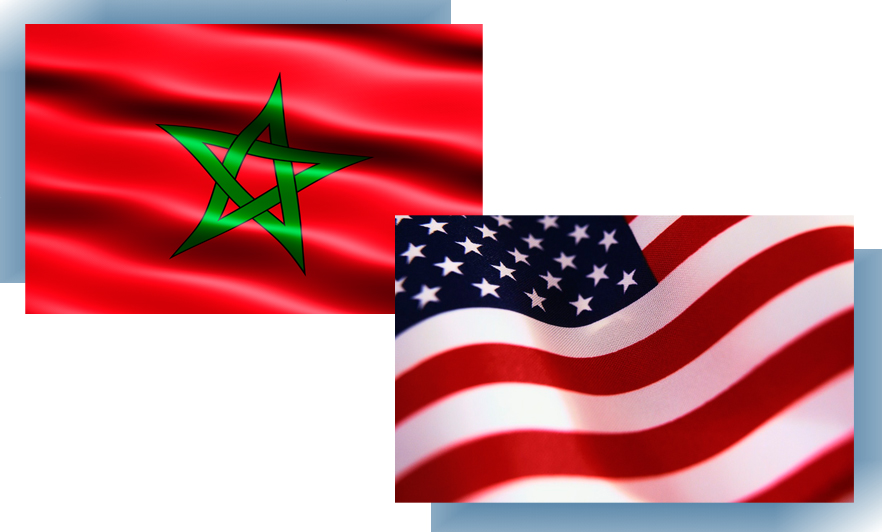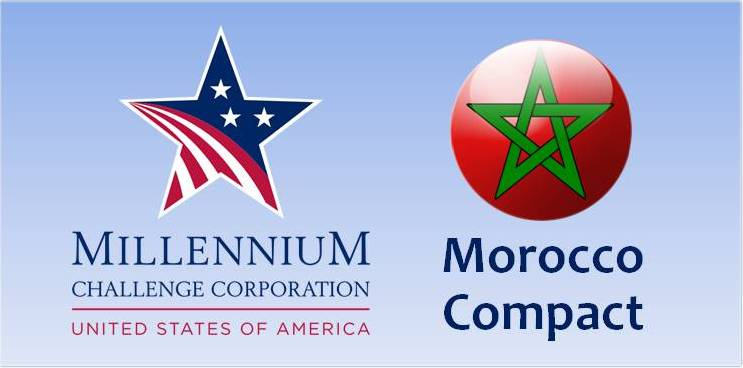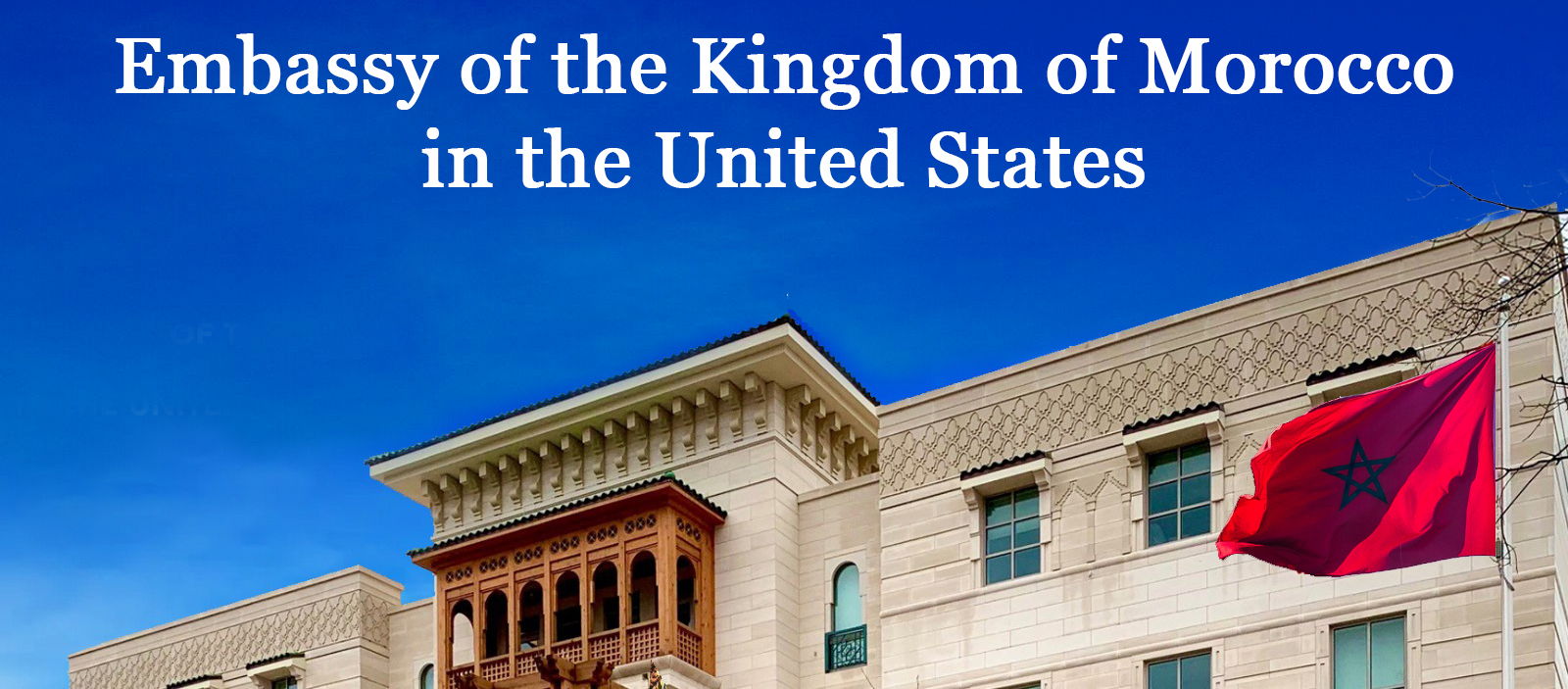
Political dialogue
The Kingdom of Morocco and the United States of America share a special and longstanding alliance dating back to 1777 when Morocco became the first country to formally recognize the newly independent United States. In 1786, Morocco and the U.S. signed a Treaty of Friendship, which remains in force to date, making it the longest-standing unbroken treaty in US history. This treaty, signed by the Sultan of Morocco, Mohammed III, and Thomas Jefferson, solidified US-Moroccan relations and laid the foundation for strong bilateral ties characterized by mutual respect, cooperation, and a shared commitment to promoting peace, stability, and welfare.
Under the leadership of King Mohammed VI, Morocco‐US bilateral relations have advanced cooperation in political, economic, social, and security domains. These partnerships are marked by a common will to enhance joint efforts in various fields, including combating terrorism, strengthening economic ties through initiatives like the Free Trade Agreement, bolstering military cooperation by granting Morocco the status of Major non‐NATO Ally, and implementing over 1 billion USD Compact with the Millennium Challenge Corporation aimed at reducing poverty and fostering economic growth.
Today, the Morocco – US relationship remains robust as both countries share common concerns and engage closely on security, political, economic, and sustainable development issues. Morocco is a staunch partner in counterterrorism efforts, collaborating closely with US law enforcement to safeguard national security interests. The two countries coordinate efforts to promote regional stability and security through initiatives such as the Global Counterterrorism Forum GCTF and the Global Coalition to Defeat ISIS. Furthermore, with aligned interests and values, Morocco and the United States collaborate jointly to enhance regional security, create economic opportunities, and address pressing global challenges in the Middle East and Africa.
Morocco-US bilateral relations have been consolidated through the signature of several cooperation agreements spanning technical, scientific, economic, and cultural dimensions. Successive Royal visits have charted a roadmap for future cooperation with the United States, providing added momentum to bilateral collaboration.
Today, as a stable, democratizing, and liberalizing nation, Morocco stands as a key US partner in the Middle East and Africa. The two countries closely consult on regional security, political and economic issues, and sustainable development. Morocco continues to play a pivotal role in counterterrorism efforts, collaborating closely with US law enforcement to protect national security interests.
Bilateral Economic Relations
The economic ties between The Kingdom of Morocco and the United States date back to 1777, when the Moroccan Sultan Mohamed Ben-Abdallah issued a declaration allowing American vessels to freely enter Morocco’s ports, similar to other countries with which Morocco had commercial treaties.
To strengthen these existing bilateral economic relations, Morocco and the United States signed a Free Trade Agreement (FTA) on June 15th, 2004, which was implemented on January 1st, 2006. This agreement positioned Morocco as the only African nation and the second Arab country to have an FTA with the U.S. The FTA facilitates the elimination of customs duties on over 95% of the goods and services traded between the two countries, creating new opportunities for trade and investment for Moroccan and US private sectors.
Trade
 Since the FTA came into force, overall bilateral trade has significantly increased, with the United States becoming Morocco’s third largest trading partner, following France and Spain. U.S. exports to Morocco have surged by 700% since 2005, rising from $480 million to nearly $3.4 billion in 2023, while Morocco’s exports to the U.S. have tripled in value, reaching $1.6 billion in 2023 compared to $445 million in 2005.
Since the FTA came into force, overall bilateral trade has significantly increased, with the United States becoming Morocco’s third largest trading partner, following France and Spain. U.S. exports to Morocco have surged by 700% since 2005, rising from $480 million to nearly $3.4 billion in 2023, while Morocco’s exports to the U.S. have tripled in value, reaching $1.6 billion in 2023 compared to $445 million in 2005.
Morocco ranks as the United States’ 72nd largest trading partner and fourth in Africa, following South Africa, Egypt, and Nigeria. Most imports from Morocco include phosphates (fertilizers), agricultural products, and apparel, while major U.S. exports to Morocco consist of energy-related products, mechanical parts, and aircrafts. Refineries in Texas and Louisiana supply petroleum products, while the Boeing Company in Washington State provides aircrafts and aerospace products.
Characteristics of bilateral trade
 Energy imports from the U.S. represent a significant component of Morocco’s trade deficit. In addition to fuel and petrochemicals, aerospace products such as aircraft and aeronautic parts constitute the second-largest export category. Other U.S. exports to Morocco include agricultural products such as processed and fresh foods from Louisiana and Georgia states.
Energy imports from the U.S. represent a significant component of Morocco’s trade deficit. In addition to fuel and petrochemicals, aerospace products such as aircraft and aeronautic parts constitute the second-largest export category. Other U.S. exports to Morocco include agricultural products such as processed and fresh foods from Louisiana and Georgia states.
 With its significant phosphate resources, Morocco’s main exports to the U.S. are phosphates and fertilizers. Fruits, vegetables, woven apparel, electrical machinery, prepared fish, and olive oil are also important export commodities for Morocco, as well as sulfur, salt, and stones.
With its significant phosphate resources, Morocco’s main exports to the U.S. are phosphates and fertilizers. Fruits, vegetables, woven apparel, electrical machinery, prepared fish, and olive oil are also important export commodities for Morocco, as well as sulfur, salt, and stones.
Trade by States



Free Trade Agreement (FTA):
Morocco has established itself as a hub for shipping, logistics, finance, assembly, and sales. More than 150 U.S. companies operate in Morocco, particularly in the renewable energy, infrastructure, automobile, aeronautics, pharmaceutical, and environmental technology sectors.
In 2004, Morocco signed the sole free-trade agreement (FTA) in Africa with the United States. Since its enactment in 2006, Moroccan exports to the United States have more than doubled, and U.S. exports to Morocco have more than quadrupled. The FTA has facilitated the increase of foreign direct investment by promoting a conducive business climate, harmonizing standards, and providing legal guarantees for investors.
The Millennium Challenge Cooperation (MCC)
In August 2007, Morocco signed the first US Millennium Challenge Corporation (MCC) agreement, committing over 1 billion USD to reduce poverty and stimulate sustainable economic growth. These strategic investments aimed to enhance productivity and employment in high-potential economic sectors. Small business creation and economic growth were further supported through investments in financial services and enterprise support. A second compact was signed in 2015 focusing on improving the quality of human capital and land productivity. Both compacts have been successfully completed marking a fifteen year partnership that speaks to the mutual friendship between Morocco and the US.
Morocco – US Security Cooperation
Morocco has demonstrated leadership on security issues by implementing significant measures to combat domestic terrorism and cooperating closely with the United States and other regional allies. Morocco-US cooperation in combating terrorism is exemplary, with joint efforts praised by US officials since the 9/11 terrorist attacks. Morocco actively participates in countering terrorism, notably through its leading role in the Global Coalition to fight Daesh.
Morocco continuously aligns with international efforts to defeat terrorism and addresses its root causes by promoting democracy, tolerance, moderation, and freedom. The Kingdom adopts a multidimensional approach to combat violent extremist ideologies, integrating security measures with strategies aimed at religious field reform, women's empowerment, and socio-economic development to enhance living conditions for all Moroccans.
Morocco-US Defense Cooperation
Morocco stands as one of the U.S.'s closest partners in Africa, with bilateral relations anchored in respect, trust, and security cooperation. Over the past three decades, Morocco has hosted numerous annual joint exercises with American troops, including African Lion, the largest annual military rehearsal in Africa. In 2023, this exercise involved 8,000 service members from Africa, Europe, and North America. Additionally, Morocco signed a 20-year partnership with the Utah National Guard, exemplifying joint peace and security operations and humanitarian activities, serving as a model partnership on the African continent.
In 2020, Morocco and the United States agreed on a ten-year Military Cooperation Agreement (MCA), aimed at renewing the bilateral alliance to address regional challenges while enhancing the national military industry. The establishment of the Defense Consultative Committee further solidified areas of partnership, including security cooperation, modernization, intelligence capabilities, peacekeeping operations, and combating illicit activities.
Joint exercises and trainings
Morocco and the United States share mutual concerns and engage in close consultations regarding security issues.
Designated as a Major Non-NATO Ally, Morocco hosts the annual African Lion joint military exercise with the U.S. This exercise aims to bolster shared defense capabilities and enhance cooperation in countering transnational threats and violent extremist organizations.
Morocco is a staunch partner in counterterrorism efforts and collaborates closely with U.S. law enforcement agencies to safeguard the national security interests of both countries.
Both Morocco and the U.S. coordinate their efforts to promote regional stability and security through various forums such as the Global Counterterrorism Forum and the Global Coalition to Defeat ISIS.
The two nations participate in a range of bilateral programs and training initiatives aimed at:
● Modernizing the Moroccan military
● Enhancing military interoperability
● Combating the proliferation of nuclear, chemical, and biological weapons
● Strengthening Moroccan authorities' expertise in crisis management, border security, and terrorism investigations.
Morocco - U.S. Security Cooperation
Morocco is a vital U.S. partner on a wide range of regional security issues, with a shared goal of a stable, secure, and prosperous Middle East and North Africa. Morocco works closely with The United States to promote regional stability, counter terrorism, strengthen trade and investment ties, and support Morocco’s development and reform efforts.

 Menu
Menu